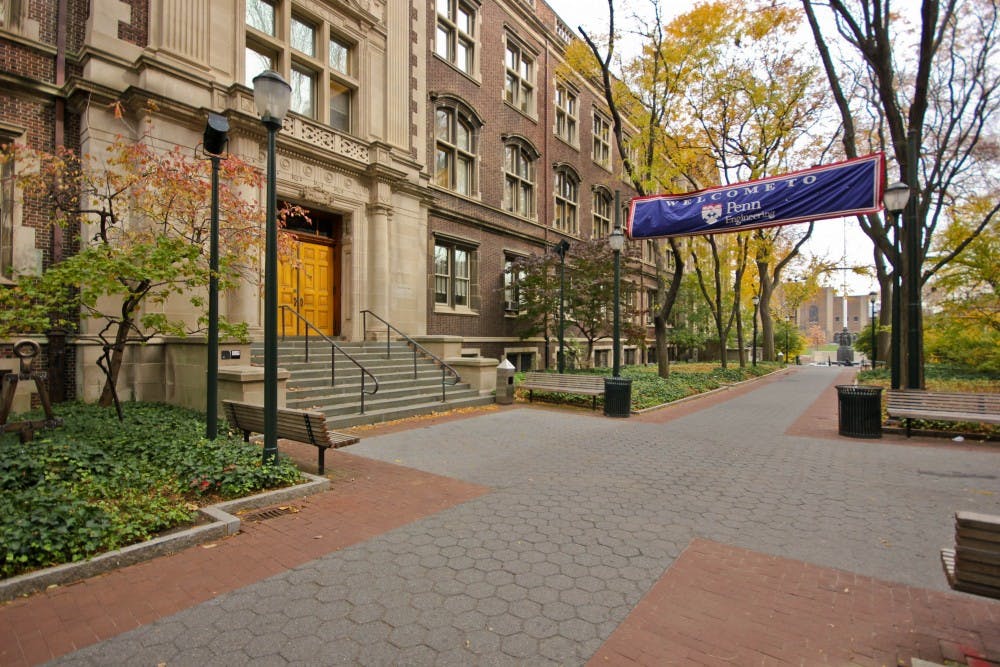
Last year, the Penn Biomedical Engineering Society won the Outreach Achievement Award from the BMES national organization. | DP File Photo
Credit: Luke ChenA Penn society is making a name for itself nationally.
Last year, the Penn Biomedical Engineering Society in conjunction with its graduate student branch, the Graduate Association of Bioengineers, competed with over 60 other chapters from around the country to win the Outreach Achievement Award from the BMES national organization.
Following up on this impressive honor, last month the society received the Meritorious Achievement Award, the most significant award the national organization gives out, signifying excellence across every aspect of the chapter.
“I think when you take a 30,000-foot view of the group, what you’ll see is that you have a group of people ... that comes together because they’re interested in continuing their own professional development, the development of those around them, impacting the surrounding community, those younger than them, those older than them," said Engineering Ph.D. candidate and last year's co-President of the BMES Ben Freedman. "All of us, we think that this provides a much richer community and a much more remarkable group of students.”
Kush Mehta, a senior working on his master's in biomedical engineering, described the award as an acknowledgement of the chapter’s continuing success in innovating how the bioengineering community interacts both internally and externally.
“This year we won the all-around award because of several initiatives related to professional development, community service and then the social aspect of bringing the biomedical engineering community together,” Mehta said.
One major cornerstone of the community outreach is a day where the BMES hosts a group of about 60 students from surrounding Philadelphia middle schools.
“We bring these kids to Penn for a day of science doing all sorts of activities like understanding how the neural networks in the brain work through art activities. Every demo they do is hands on,” Freedman said.
“That’s the beauty of the event,” Mehta said. “Concepts that we learn at a very high level are made to be relatable to them through the visualization of these applications, and that’s direct exposure to various STEM fields. There are certain opportunities in the biomedical engineering realm that they didn’t even know about, that we were able to discuss with them.”
In terms of internal development, the society also has put together a mentorship program between more senior, experienced students and over 200 younger ones looking to broaden their understanding of what the biomedical engineering path looks like. Currently, BMES is expanding the program to include alumni.
"The sort of community outreach that we do allows these undergraduate students to start mentoring those younger than them so that they can make that broader impact," Freedman said.
The society also has events where graduate students give talks about their research over a casual lunch or where industry professionals come in to give students perspectives on careers inside and outside of academia. It also has an annual bioengineering symposium with a keynote speaker from outside of Penn.
“One thing that is so important about this mentorship program is that there’s a lot of transparency. There’s a committee that receives feedback from mentors and mentees so that we can better improve interactions among them and also the big events that we do,” Mehta said.
The success of these initiatives attracted national attention for the chapter, which aspires to serve as a blueprint for other professional societies both at Penn and across the country.
“Last spring we were at another university at a chapter meet-up conference, where we gave a talk on the mentor program in detail — what it means to be a mentor, what are the needs and wants of a mentor or mentee," Freedman said. "This program that we developed has definitely become an integral part of our department, and I think it can start to become a model system for other departments on campus.”
This year, the group is giving a keynote address about fostering their initiatives at the national conference in Tampa to an audience of industry professionals, student chapters and associated faculty — a potent example of Penn students leading the way in the professional development of their peers.
“We hope to share our knowledge and experience with everybody else,” Freedman said.
The Daily Pennsylvanian is an independent, student-run newspaper. Please consider making a donation to support the coverage that shapes the University. Your generosity ensures a future of strong journalism at Penn.
DonatePlease note All comments are eligible for publication in The Daily Pennsylvanian.








